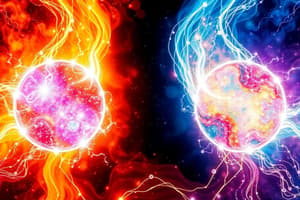Podcast
Questions and Answers
Which statement best describes oxidation in a redox reaction?
Which statement best describes oxidation in a redox reaction?
- Oxidation is the conversion of iron to an oxide.
- Oxidation is the gain of electrons or a decrease in the oxidation state.
- Oxidation is the loss of electrons or an increase in the oxidation state. (correct)
- Oxidation is the transfer of an atom from one substrate to another.
What is the main difference between electron-transfer and atom transfer redox reactions?
What is the main difference between electron-transfer and atom transfer redox reactions?
- In electron-transfer reactions, electrons are lost by the atom being oxidized, while in atom transfer reactions, electrons are lost by the atom being reduced.
- In electron-transfer reactions, electrons are gained by the atom being oxidized, while in atom transfer reactions, electrons are gained by the atom being reduced.
- There is no difference between electron-transfer and atom transfer redox reactions.
- In electron-transfer reactions, only one electron flows between the atoms, while in atom transfer reactions, multiple electrons are transferred. (correct)
What is the role of electrode potentials in redox reactions?
What is the role of electrode potentials in redox reactions?
- Electrode potentials determine the rate of redox reactions.
- Electrode potentials do not play a role in redox reactions.
- Electrode potentials determine the type of redox reactions.
- Electrode potentials determine the direction of redox reactions. (correct)
Which of the following is an example of oxidation reaction?
Which of the following is an example of oxidation reaction?
What other chemical species can serve the same function as oxides in oxidation reactions?
What other chemical species can serve the same function as oxides in oxidation reactions?
Flashcards
What is oxidation?
What is oxidation?
Loss of electrons or increase in oxidation state.
Electron vs. Atom Transfer?
Electron vs. Atom Transfer?
Electron-transfer involves one electron; atom transfer involves multiple electrons.
Role of electrode potentials?
Role of electrode potentials?
Electrode potentials dictate the direction of electron flow.
Example of oxidation?
Example of oxidation?
Signup and view all the flashcards
Oxide alternative?
Oxide alternative?
Signup and view all the flashcards
Study Notes
Redox Reactions
- Oxidation in a redox reaction involves the loss of one or more electrons by an atom, molecule, or ion, resulting in an increase in its oxidation state.
Types of Redox Reactions
- The main difference between electron-transfer and atom transfer redox reactions is that electron-transfer reactions involve the transfer of electrons, whereas atom transfer reactions involve the transfer of atoms or groups of atoms.
Role of Electrode Potentials
- Electrode potentials play a crucial role in redox reactions, as they determine the tendency of a species to lose or gain electrons.
Examples of Oxidation Reactions
- The combustion of gasoline in a car engine is an example of an oxidation reaction, where the gasoline (fuel) is oxidized to produce energy.
Alternative Chemical Species in Oxidation Reactions
- Other chemical species that can serve the same function as oxides in oxidation reactions include halogens, such as chlorine and bromine, and nitric acid.
Studying That Suits You
Use AI to generate personalized quizzes and flashcards to suit your learning preferences.



